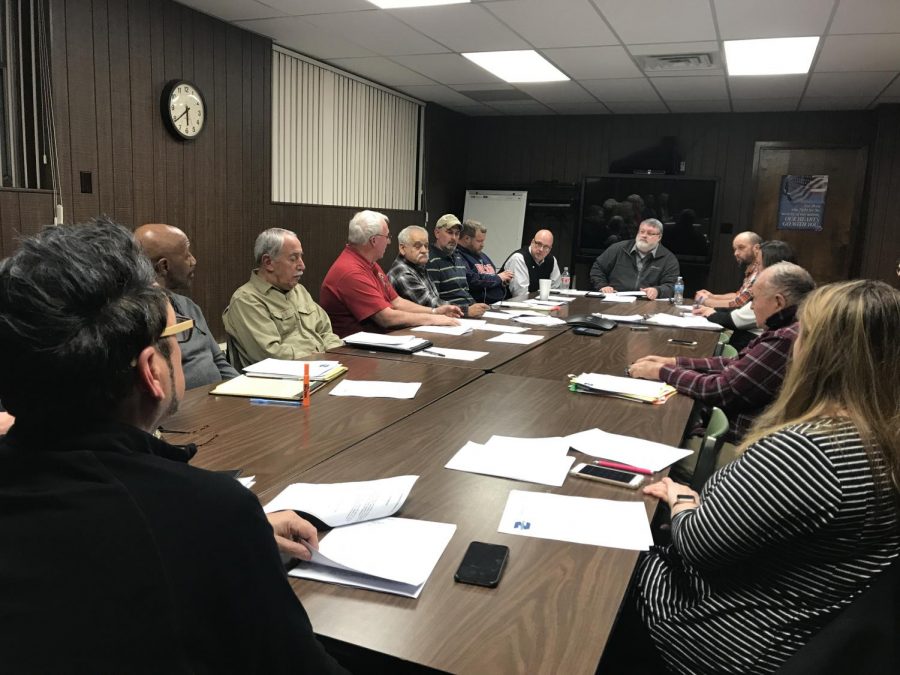Council taking final vote on nuisance abatement ordinance next meeting
January 17, 2019
Zanesville City Council approved a set of amendments to the city’s proposed nuisance abatement ordinance during Monday night’s meeting, but the final vote of approval will come at the second meeting this month.
The ordinance has been in the works since the conclusion of a lengthy nuisance abatement process of a property on Homewood Avenue in the spring of 2017.
According to Muskingum County Assistant Prosecutor John Litle, the abatement took nearly 18 months to complete and included multiple notices and meetings, a court hearing, detailed documentation and the help of several city and county departments to clear the house of its contents.
Law enforcement dedicated an entire shift to abating the property, inmates from the jail hauled items out of the house, detectives categorized and documented each item removed and an entire city streets division boarded up the house the day of the abatement, Litle said.
“All of this is just completely inefficient. I am a felony prosecutor. My time should be dedicated to prosecuting felony crimes,” said Litle. “I understand there’s a lot of other things I’m doing to try and fix things up, but the city needs to have something, like every other city in Ohio has, where it’s just an administrative function, you have ongoing fines if you don’t comply, and then if that continues, you know, the city can proceed against these structures.”
It was that abatement that prompted Litle to meet with City Law Director David Tarbert and the chair of the Public Safety Committee at the time, Andrew Roberts, to draft a nuisance abatement ordinance.
The ordinance is designed to combat properties known to cause ongoing problems throughout the city. If passed, law enforcement will have the ability to issue notices to both residential and commercial properties for ongoing nuisances or felony drug offenses. If the issue is not resolved, the owner of the property can be fined for further occurrences.
During a special Public Safety Committee meeting last week, members voted to recommend several changes to the ordinance, including the elimination of the private cause of action section intended to grant private citizens the ability to declare their neighbors nuisances in addition to law enforcement.
“I am fully in favor of striking it. I think it’s going to make this entire process a little bit cleaner,” said Council Member Andrew Roberts. “There’s one path, not two paths, and it basically holds it all within the city’s realm instead of putting it out on the public realm as well.”
Committee Chair Rob Sharrer said he was originally in support of the section, but changed his mind after hearing public input at previous meetings.
“After discussion, we had determined you can sue for anything, basically, and we didn’t know that we wanted to take on the whole neighborhood or anyone within 1,000 feet or whatever distance that we came up with,” said Sharrer.
Had the committee chosen to keep the private cause of action section in the ordinance, residents would have been given a structured guideline for monitoring nuisance activity in their neighborhoods and declaring certain properties nuisances.
“That was something that I specifically wanted to be added in there because I felt that it would be something beneficial to people in the community to empower them to do something to improve their own neighborhoods,” said Litle.
Although Litle said he understands the City’s desire to simplify the process for abating nuisances in its early stage of adoption, he believes those living with the problem would be most inclined to take action as opposed to government officials.
“The people who are subject to having people overdosing on the streets in front of their kids and having needles littered all over the place and who have to sit and deal with the ongoing nonsense are the people who are most motivated to address this issue,” said Litle.
If the ordinance passes and nothing is done about nuisance properties in the hands of officials, Litle said he will likely be back before council requesting a way for residents to hold property owners accountable.
Without the private cause of action section, nuisance declaration will lie in the hands of law enforcement, which Zanesville Police Chief Tony Coury sees as a last resort for his department if other channels for resolving the problem fail.
“I don’t have time in the day to fire out hundreds of letters to these landlords, so I don’t think it’s going to be something that we do every week,” said Coury. “It’s going to be that last step, the last thing on our list to make sure we get it cleaned up.”
Coury explained that, oftentimes, landlords will work with the police department to promptly take care of the issue at hand.
“We have issues with some landlords that benefit and prosper on renting houses to drug dealers,” said Coury. “As long as they’re getting money, they don’t really care what’s going on. We want to stop that.”
Ideally, Coury said the nuisance abatement ordinance will help ZPD address issues with absentee landlords who don’t live within the city limits to understand the problems their properties create.
“There’s several multi-complexes around town that are owned by people outside of the City of Zanesville who sometimes are almost impossible to get a hold of, but once we send the certifiable letter, we have some teeth then to shut these places down,” said Coury.
Public Safety Director Keane Toney said the ordinance serves as a good tool, but not the only one.
“People think this is the magic wand or the magic bullet that’s going to solve everything,” said Toney. “It’s not, but it’s another tool to use to help neighborhoods maintain their integrity.”
During the Public Safety Committee meeting, members emphasized to property owners in attendance that the ordinance was not designed to attack landlords.
“I think it helps the landlords, honestly. It gives them teeth to say ‘I don’t have a choice. You have to go, or they’re going to take my property or they’re going to lock my property up,’” said Coury. “It’s not an ordinance to just board down every single house in the city. That’s impossible, but it is a tool for us.”
Other changes made to the ordinance include the removal of the section which declares City health and safety or sanitation violations nuisances. Clarifications in phrasing were also made within the document to remove any ambiguities. Those changes will be voted on during the Jan. 28 council meeting.
“I’m glad that the city is doing this,” said Litle. “I think it’s an important step forward for the city to try and address this problem.”
Litle added that despite a neighborhood’s reputation, there are more hard-working people with families trying to maintain peaceable homes living amongst nuisance properties scattered throughout the city.
“These are people who deserve the city to help them,” said Litle. “They don’t deserve to have all this stuff going on endlessly and without any addressing of the issue, in my opinion.”













